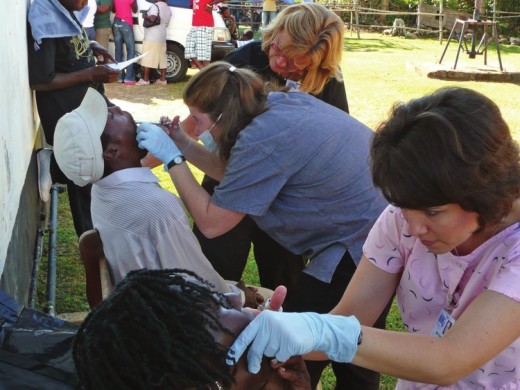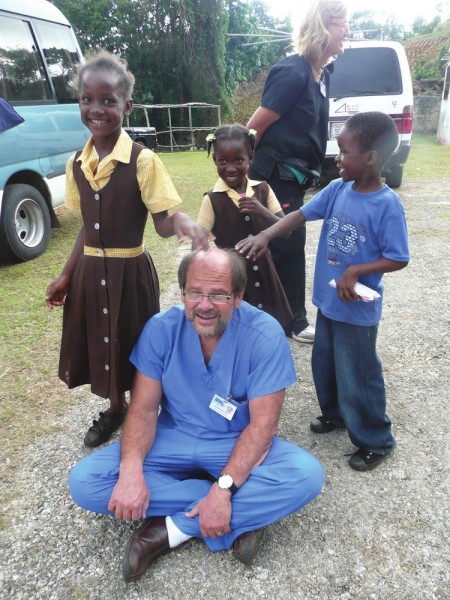Beyond Our Borders
by Molly Wright
May 27, 2011

But for one week in February, Willett leaves behind all these comforts to treat patients in impoverished villages where a single chair under the trees is often the only office space available. This year is no exception. From Feb. 5 to 12, Willett’s team, including two area high school students, traveled to Jamaica to once again offer free dental services, a boon to many who might only dream of having their pain alleviated. Guided by a strong faith and a desire to help others, Willett’s service is a gift to many, a gift that far outweighs the primitive working conditions they encounter when they arrive.
Born in St Louis, Willett considered a dental career at an early age. “I wanted to do something different in my life,” he said. “I liked science. I liked people. I liked biology. There was even a dentist down the street, and I liked him.”
Then again, Willett’s parents, his father, an electrical engineer, and mother, the director for foreign exchange students in St Louis in the 1960s, also influenced his decision to choose a service-minded career. “School, church, community programs, they were always busy,” he said. So in 1976, after receiving his B.S. in microbiology from the University of Missouri, Willett enrolled in the University of Missouri-Kansas City and obtained his dental degree in 1980.
When he set up his Columbia practice in 1981, Willett was familiar with medical mission trips; in fact, the idea of helping others in foreign countries appealed to him. But back then, organizations sponsoring the trips normally required a month-long commitment, a time frame Willett felt was too long to be away from his practice. So, when an office assistant suggested medical mission work, Willett said, “If you can find a mission trip that’s only a week, I’ll go.”
The assistant discovered Medical Ministry International, an organization dedicated to meeting the medical needs of the world’s poor, that offered one- and two-week mission trips. It was a match seemingly made in heaven, so Willett made good on his promise. That was 25 years ago. The team has used MMI for their mission trips ever since and has visited Jamaica every year except one, when they went to the Dominican Republic.
Preparation for every mission trip begins months ahead of time. Willett said the first priority is choosing team members who get along and can rely on one another in a foreign country. It’s not surprising then that his team consists mostly of office staff and their extended families, people he knows and trusts. According to Libby Grantham, a 17-year dental hygienist with Willet and 10-year mission trip member, all of Willett’s office staff and most of their children, as well as Willett’s wife, Vicki, and their two children, Brie and Landon, have participated in the mission trips during the years. Her own daughter went when she was 18 and again at 23. “Our kids need to see how most of the rest of the world lives,” Grantham said. Linda Ealy, Willett’s office manager for the past 15 years, brought one of her daughters twice, and when the other daughter married, her son-in-love, as she refers to him, participated as well.
After the team is chosen, packing is the next concern. Although pharmaceutical supplies await them in Jamaica, surgical tools and materials must be brought from home. Also, food, though provided where they stay, is limited to the basics, such as oatmeal and maybe an egg for breakfast, rice and beans and occasionally chicken for lunch and dinner. So tuna, peanut butter, beef jerky and a favorite, Laughing Cow Cheese, are packed to break up the monotony. When the team finally boards the plane, along with their personal luggage, they haul four large plastic tubs as well.

Upon rising Monday morning, they have a quick breakfast, a prayer and an overview of the day before heading out to their first destination. Each ride can take anywhere from a half hour to an hour or more depending on the location. According to Grantham, where they set up in each village varies. “Sometimes we go to churches or schools, but usually health clinics.”
According to Willett, even if the village has a health clinic, they often station their dental area outside because the clinics are very small, maybe 1,000 square feet and four rooms, and the medical doctors they travel with need more privacy for their patients.
The team generally works from 8 to 5, but they stay later if necessary so everyone waiting gets the chance to receive dental and/or medical care. Because the Jamaican nurses who staff the health clinics advertise the team’s visit, long lines often await them upon arrival. Grantham describes how important these visits are for the villagers: “They get all dressed up because it’s a very big deal. They could walk for miles and wait for hours.”
Willett’s team offers dental checkups and education, but according to Willett, extractions take up the majority of their time. “We see about 50 people a day and pull about 80 teeth, using only local anesthesia.”
Willett believes diet is the primary culprit for the poor dental health they see in those they treat. The children snack on sugar cane, and soda and juice are often preferred over water by the people in the communities. Lack of regular dental checkups is also to blame, according to Grantham. “They don’t always have access to dental care, so it just gets worse and worse,” she said. Although dental services are available in Santa Cruz, about 12 miles inland, transportation and money issues make this option difficult for many.
Undoubtedly, the patients who receive medical services through the mission groups are thankful. Willett, and others who have made the journey, though, would say the experience touches those who serve just as deeply. “Often, the girls cry over patients,” Willet said referring to his women staff members. “It’s just the desperateness of it. They (the patients) live in shacks; yet, they’ll stay in the clinic all day and offer to clean up.”
Although this year’s mission trip was 25th, Willett looks forward to yet another opportunity to serve those who are less fortunate. In fact, Willett considers a week away from his furnished office not a hardship but a privilege and a personal responsibility, based on his faith and the many blessings he has received in his own life. “I think 50 percent of the world lives on $2 a day or less,” he said. “The wealth I need to keep in perspective. I’ve been given much. There is no satisfaction in keeping. You are blessed more in giving.”
Then, referencing a favorite bible verse, he add, “From everyone who has been given much, much will be demanded; and from the one who has been entrusted with much, much more will be asked.” (Luke 12:48)


